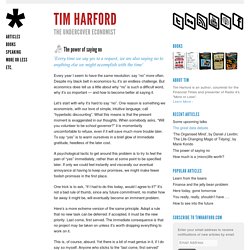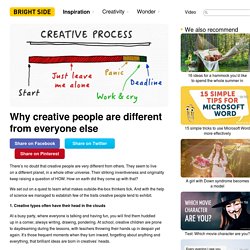

The power of saying no. ‘Every time we say yes to a request, we are also saying no to anything else we might accomplish with the time’ Every year I seem to have the same resolution: say “no” more often.

Despite my black belt in economics-fu, it’s an endless challenge. But economics does tell us a little about why “no” is such a difficult word, why it’s so important — and how to become better at saying it. Let’s start with why it’s hard to say “no”. One reason is something we economists, with our love of simple, intuitive language, call “hyperbolic discounting”. A psychological tactic to get around this problem is to try to feel the pain of “yes” immediately, rather than at some point to be specified later. One trick is to ask, “If I had to do this today, would I agree to it?” Here’s a more extreme version of the same principle. Neuroscience says these five rituals will help your brain stay in peak condition. This piece has been corrected.

Thanks to improvements in medicine, more of us are living longer. That makes we have a heightened investment in making sure our brains stay in shape as we age, too. While an increased life expectancy will not necessarily lead to a higher incidence of cognitive disorders, Alzheimer’s alone is expected to affect over seven million American seniors by 2025.
Lucky for us, advanced technologies have enabled researchers to understand how the brain works, what it responds to, and even how to retrain it. For instance, we know our brains prefer foods with high levels of antioxidants, including blueberries, kale, and nuts. Whether you’re 25 or 65, consider adopting these five simple rituals that cognitive scientists say can help your brain grow new cells, form new neural pathways, improve cognition, and keep your outlook positive and sharp. Congratulate yourself for small wins Both progress and setbacks are said to greatly influence our emotions. Keep your body active. TED videos. Productivity. Psychology. When Your Calling Seems Vague and Unclear, You’re on the Right Track. When Your Calling Seems Vague and Unclear, You’re on the Right Track Most people don’t know what to do with their lives.

And that’s okay. “We see in order to move; we move in order to see.” —William Gibson These days, there’s a lot of talk about discovering your dream. More and more people are unwilling to exchange their ideals for a paycheck. I’m sure there are people who know exactly what they were born to do, who have had a vision of their life since they were six years old. So where do you go from there, if all you’ve got is an itch, a vague premonition of an un-lived life? That was the question I sought to answer in my book, The Art of Work. Lesson 1: Don’t wait for clarity “I have never had clarity. The other day, I was on a call with a young woman who was passionate about getting involved in social work — she just didn’t know where to start. As the discussion continued, she confessed that she didn’t know what her calling was. Takeaway: Clarity comes with action. So where do you start?
Why creative people are different from everyone else. There’s no doubt that creative people are very different from others.

They seem to live on a different planet, in a whole other universe. Their striking inventiveness and originality keep raising a question of HOW. How on earth did they come up with that? We set out on a quest to learn what makes outside-the-box thinkers tick. And with the help of science we managed to establish few of the traits creative people tend to exhibit. 1. At a busy party, where everyone is talking and having fun, you will find them huddled up in a corner, always writing, drawing, pondering. 2. For them, anything can serve as a source of inspiration: landscapes, architecture, items of clothing or decoration. 3. Wake up at 7 a.m., eat lunch at noon, have an afternoon snack at 4 p.m., dinner at 7 p.m., retire to bed at 10 p.m., repeat — this is definitely not the way of creative people.
Visual Thinking + Synthesis. Photo by Ken Yeung I really enjoy talking complex subjects, processes or business problems and boiling them down to their core essence.

This is becoming known as the process of "Visual Thinking". I use visual metaphors and storytelling to do this. My style of visual thinking is immediately recognizable and has helped me build a strong following of influential professionals who use my visuals in their own presentations and documents. A comprehensive archive of my visuals can be found on Flickr (please credit if you use them) and if you are interested in Visual Thinking as a discipline, you can visit VizThink for additional resources. Business Analysis. Tiny Houses & Teardrops. FileMaker. All things iPhone / iPad (iLounge) Readdle. Database Software.
Younity. Qigong Summary. Creativity.